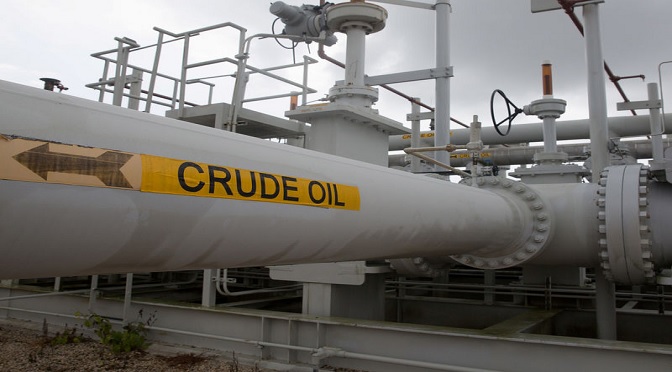-
Authoradmin
-
Comments0 Comments
-
Category
By Henning Gloystein
SINGAPORE (Reuters) – Oil prices dropped by around 1% on Thursday, extending falls from the previous session amid surging U.S. crude inventories and weak demand from refineries.
Brent crude futures, the international benchmark for oil prices, were at $70.36 per barrel at 0652 GMT, down 63 cents, or 0.9%, from their last close.
U.S. West Texas Intermediate (WTI) crude futures were down by 51 cents, or 0.8%, at $60.91 per barrel.
Crude futures already fell by around 2% the previous day.
“Rising inventories and a slowdown with refined product demand could suggest we could see further pressure (on prices),” said Edward Moya, senior analyst at futures brokerage OANDA.
U.S. crude oil inventories rose last week, hitting their highest levels since July 2017, due to weak refinery demand, the Energy Information Administration said on Wednesday.
Commercial U.S. crude inventories rose by 4.7 million barrels in the week ended May 17, to 476.8 million barrels, their highest since July 2017, the EIA data showed.
Beyond weak refinery demand for feedstock crude oil, the increase in commercial inventories also came on the back of planned sales of U.S. strategic petroleum reserves (SPR) into the commercial market.
U.S. crude oil production climbed by 100,000 barrels per day (bpd) to 12.2 million bpd, putting output near its record of 12.3 million bpd reached late last month.
(GRAPHIC: U.S. oil drilling, production & storage levels – https://tmsnrt.rs/2DxgF8W)
Ole Hansen, head of commodity strategy at Saxo Bank, said “concerns about slowing (oil) demand growth due to the negative impact on the global economy of the U.S.–China trade war” were also weighing on oil prices.
Countering these bearish price factors have been escalating political tensions between the United States and Iran, as well as ongoing supply cuts led by the Organization of the Petroleum Exporting Countries (OPEC) that started in January in an effort to prop up the market.
“Large but opposing forces have kept Brent in a $70-$75 per barrel range in recent weeks,” Morgan Stanley (NYSE:MS) said in a note on oil markets published this week.
“Macro economic data has rapidly deteriorated, and this is reflected in weaker oil demand. At the same time, downside risk to supply is materializing in key countries (adding to OPEC’s production cuts),” the U.S. bank said.
“On balance, however, we still see tightness in 2H19,” Morgan Stanley said, adding it expected Brent to trade in the $75-$80 per barrel range in the second half of 2019.
French bank BNP Paribas (PA:BNPP) said high inventories meant that OPEC would likely keep its voluntary supply cuts in place.
“Supply management is here to stay,” the bank said.
Recent Comments
- Starlight Herot on Euro Higher on German Data, Sterling Edges Lower
- Frost Dragont on Euro Higher on German Data, Sterling Edges Lower
- Gwinnettt on Euro Higher on German Data, Sterling Edges Lower
- Vanessat on Euro Higher on German Data, Sterling Edges Lower
- Christinet on Euro Higher on German Data, Sterling Edges Lower
Archives
- April 2025
- March 2025
- February 2025
- January 2025
- December 2024
- November 2024
- October 2024
- February 2024
- July 2023
- July 2021
- May 2021
- March 2021
- February 2021
- September 2020
- May 2020
- February 2020
- December 2019
- November 2019
- October 2019
- September 2019
- August 2019
- July 2019
- June 2019
- May 2019
- April 2019
- March 2019
- February 2019
- January 2019
- December 2018
- November 2018
- October 2018
- September 2018
- August 2018
- July 2018
- June 2018
- May 2018
- April 2018
- March 2018
- February 2018
- January 2018
- December 2017
- November 2017





